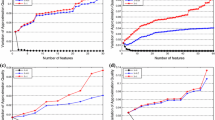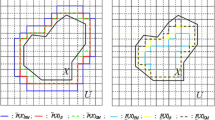Abstract
The multigranulation rough set (MGRS) is becoming a rising theory in rough set area, which offers a desirable theoretical method for problem solving under multigranulation environment. However, it is worth noticing that how to effectively extract decision rules in terms of multigranulation rough sets has not been more concerned. In order to address this issue, we firstly give a general rule-extraction framework through including granulation selection and granule selection in the context of MGRS. Then, two methods in the framework (i.e. a granulation selection method that employs a heuristic strategy for searching a minimal set of granular structures and a granule selection method constructed by an optimistic strategy for getting a set of granules with maximal covering property) are both presented. Finally, an experimental analysis shows the validity of the proposed rule-extraction framework in this paper.



Similar content being viewed by others
Notes
The generalization is an important index of depicting classifier performance. In our study, we only discuss the lower approximation reduction. If we want to analyze the generalization of extracted rules in detail, we should take the upper approximation into account and design the corresponding multigranulation rough classifier. However, describing these contents in detail is beyond the scope of this paper. We will focus on the studies of the multigranulation rough classifier and its generalization in the future work.
The granulation selection in terms of MGRS is based on the model of multigranulation rough sets, which keeps the positive region in MGRS unchanged (i.e. the definition of approximation quality is based on multigranulation rough sets theory). The proposed granulation selection is different from the attribute reduction in terms of rough set.
References
Pawlak Z (1982) Rough sets. Int J Comput Inf Sci 11:341–356
Pawlak Z (1991) Rough sets. Theoretical aspects of reasoning about data, system theory, knowledge engineering and problem solving, vol 9, Kluwer, Dordrecht
Wang FY (1998) Outline of a computational theory for linguistic dynamic systems: toward computing with words. Int J Intell Control Syst 2(2):211–224
Wang FY (2005) On the abstraction of conventional dynamic systems: from numerical analysis to linguistic analysis. Inf Sci 171(1–3):233–259
Ziarko W (1993) Variable precision rough sets model. J Comput Syst Sci 46(1):39–59
Kryszkiewicz M (1998) Rough set approach to incomplete information systems. Inf Sci 112:39–49
Skowron A, Stepaniuk J (1996) Tolerance approximation spaces. Fundamenta Informaticae 27(2–3):245–253
Slezak D, Ziarko W (2005) The investigation of the Bayesian rough set model. Int J Approx Reason 40:81–91
Dubois D, Prade H (1990) Rough fuzzy sets and fuzzy rough sets. Int J Gen Syst 17:191–209
Wu WZ, Zhang WX (2004) Constructive and axiomatic approaches of fuzzy approximation operators. Inf Sci 159:233–254
Wu WZ, Mi JS, Zhang WX (2003) Generalized fuzzy rough sets. Inf Sci 152:263–282
Zadeh LA (1965) Fuzzy sets. Inf Control 8:338–353
Zadeh LA (1996) Fuzzy logic=computing with words. IEEE Trans Fuzzy Syst 4:103–111
Zadeh LA (1997) Toward a theory of fuzzy information granulation and its centrality in human reasoning and fuzzy logic. Fuzzy Sets Syst 19:111–127
Zadeh LA (1979) Fuzzy sets and information granularity. Adv Fuzzy Set Theory Appl 11:3–18
Lin TY (1997) Granular computing. Announcement of the BISC Special Interest Group on Granular Computing
Yao YY (2000) Granular computing: basic issues and possible solutions. In: Proceedings of the 5th Joint Conferences on Information Sciences. New Jersey, pp 186–189
Yao JT (2005) Information granulation and granular relationships. In: Proceedings of 2005 IEEE Conference on Granular Computing. Beijing, pp 326–329
Qian YH, Liang JY, Yao YY, Dang CY (2010) MGRS: a multi-granulation rough set. Inf Sci 180:949–970
Qian YH, Liang JY, Yao YY, Dang CY (2010) Incomplete mutigranulation rough set. IEEE Trans Syst Man Cybern Part A 20:420–430
Lin GP, Li JJ, Qian YH (2013) Multigranulation rough sets: from partition to covering. Inf Sci. http://dx.doi.org/10.1016/j.ins.2013.03.046
Lin GP, Qian YH, Li JJ (2012) NMGRS: neighborhood-based multigranulation rough sets. Int J Approx Reason 53(7):1080-1093
Lin GP, Li JJ, Qian YH (2013) Topology approach to multigranulation rough sets. Int J Mach Learn Cybern. doi:10.1007/s13042-013-0160-x
Xu WH , Zhang XT, Wang QR (2011) A generalized multi-granulation rough set approach. In: Proceedings of International Conference on Intelligent Computing, August 11-14, Zhengzhou, China
Yang XB, Song XN , Dou HL, Yang JY (2011) Multi-granulation rough set: from crisp to fuzzy case. Ann Fuzzy Math Inf 1(1):55–70
Yang XB, Zhang YQ, Yang JY (2012) Local and global measurements of MGRS rules. Int J Comput Intell Syst 5(6):1010–1024
Zhu W, Wang F (2003) Reduction and axiomization of covering generalized rough sets. Inf Sci 152:217–230
Zhu W, Wang F (2007) On three types of covering-based rough sets. IEEE Trans Knowl Data Eng 19:1131–1144
Zhu W (2009) Relationship between generalized rough sets based on binary relation and covering. Inf Sci 179:210–225
Hu J, Wang G (2009) Knowledge reduction of covering approximation space. Transactions on Computational Science, Special Issue on Cognitive Knowledge Representation:69–80
Du Y, Hu QH (2011) Rule learning for classication based on neighborhood covering reduction. Inf Sci 181:5457–5467
Author information
Authors and Affiliations
Corresponding author
Rights and permissions
About this article
Cite this article
Liu, X., Qian, Y. & Liang, J. A rule-extraction framework under multigranulation rough sets. Int. J. Mach. Learn. & Cyber. 5, 319–326 (2014). https://doi.org/10.1007/s13042-013-0194-0
Received:
Accepted:
Published:
Issue Date:
DOI: https://doi.org/10.1007/s13042-013-0194-0




